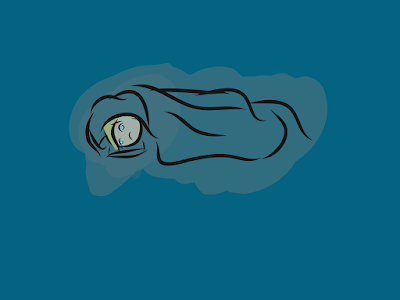In those days of course it was still a "thing," when families were still large enough and neighbors close enough that clothing that was still wearable was handed down from one child to the next, one family to the next. It was great for play clothes, getting clothing that was already a bit worn, and no one cared if you wore them in the sandbox or running around in the yard. Nicer clothes could be kept for school and church and all.
I had two sets of cousins. One on my dad's side -- I don't think we ever got clothing handed down from them. My aunt was a fashion plate, rather self-absorbed, and perhaps the idea of putting my cousin's cast-offs into a box and sending them to us never occurred to her even though we were just a year apart and about the same size. My aunt on my mother's side, however, had five children and had grown up in a household with very little income and a lot of economizing, where a box of hand-me-down clothing was a welcome gift. She was the one who boxed up whatever clothing her children had outgrown and sent them to us.
However, my aunt was sixteen when my mother was born, and her kids were all much older than my brothers and I. When a box came, one never knew what might be in it, or how old it might be, or what era the styles came from.
By the time I was in the third grade, my aunt's sons were grown men, so they were no longer outgrowing and handing on clothing. There were two girls in the family, and the youngest was seven years older than me. It was mostly her cast-offs that were boxed up and sent to us.
But still... one never knew what the box might contain.
My cousin's sartorial tastes were... not to put too fine a point on it... kind of a running joke in the family. When she was in Jr. High and High School she was sewing her own clothes, and it was when the 60s "mod" fashions were all the rage. When people today think of the 60s, they think of hippies, and no one remembers mod fashions, Carnaby Street, go-go boots, mini skirts, long swingy hair, and all that. Brady Bunch fashions were kind of the tail end of that era. "Mod" also meant that styles came and went as fast as Superman's speeding bullet. Empire waistlines, waistlines down at the hips, short skirts, plaid, stripes, skinny pants, bell bottoms, it all came in and out of fashion. On top of all that, my cousin liked to define her own style, so some of the things she made for herself were... original. Unique. Creative. And five or six or seven years out of date.
But it all ended up in a box, mailed to us, for me to sort through.
So there I was, eight years old, going through a big box that had just been mailed to us. Mom opened it up and said, "Here, sort these out." And sort I did. At age eight, living in yet another house, starting third grade in the fourth school I'd been to, I didn't have much of an idea of fashion. I didn't hang out with the cool girls, didn't even know that designer labels existed, and had only a vague idea that "mod" was a style. But as I sorted through the box I found some things that I wouldn't mind wearing, and others that were definitely out, and I sorted them into piles.
While there were some decent school dresses in this particular load, there were also some things that were wildly inappropriate for an eight-year-old kid. Shiny orange fishnet tights. White vinyl go-go boots that I'd certainly never be allowed to wear to school. A sparkly gold lamé shirt that my dad laughed at and called an "Elvis shirt."
We all got a laugh out of those tights, and many a joke about going fishing was made. Though the Elvis shirt might scare off the fish, they said.
Once I had sorted everything, I called to Mom and said I was done.
She took one look at my two piles, the decent stuff and the discards, and was not pleased. Not pleased at all.
Discarding any of the hand-me-down offerings was definitely not on her agenda. Her sister had been nice enough to send the items, and I should be grateful for them. "I didn't mean that," she said, pointing to my discard pile. "I meant sort them out by size and hang up the ones that fit you now. We'll store the rest for later."
If ever my jaw actually dropped, that was such a moment. I sat there faced with the pile of clothes that we'd all just been laughing over, all those crazy clothes that were out of date and the family joke and weird and even inappropriate. And I was supposed to hang it all in my closet? I was supposed to wear it all?
So long as my closet was full of hand-me-downs, no matter how odd, whether I wore them or not, I got very few new clothes and most of that was underwear. All I could do in my own sartorial defense was wear the things that were least objectionable and keep stuffing the ones I disliked most to the back until I outgrew them, at which point my mother would huff, "You outgrew this already? I don't think you ever wore it!"
But until the hand-me-down boxes stopped coming, it was the best I could do to not look too freaky and not draw too many sneers and snickers from the cool girls in their cool styles.















































